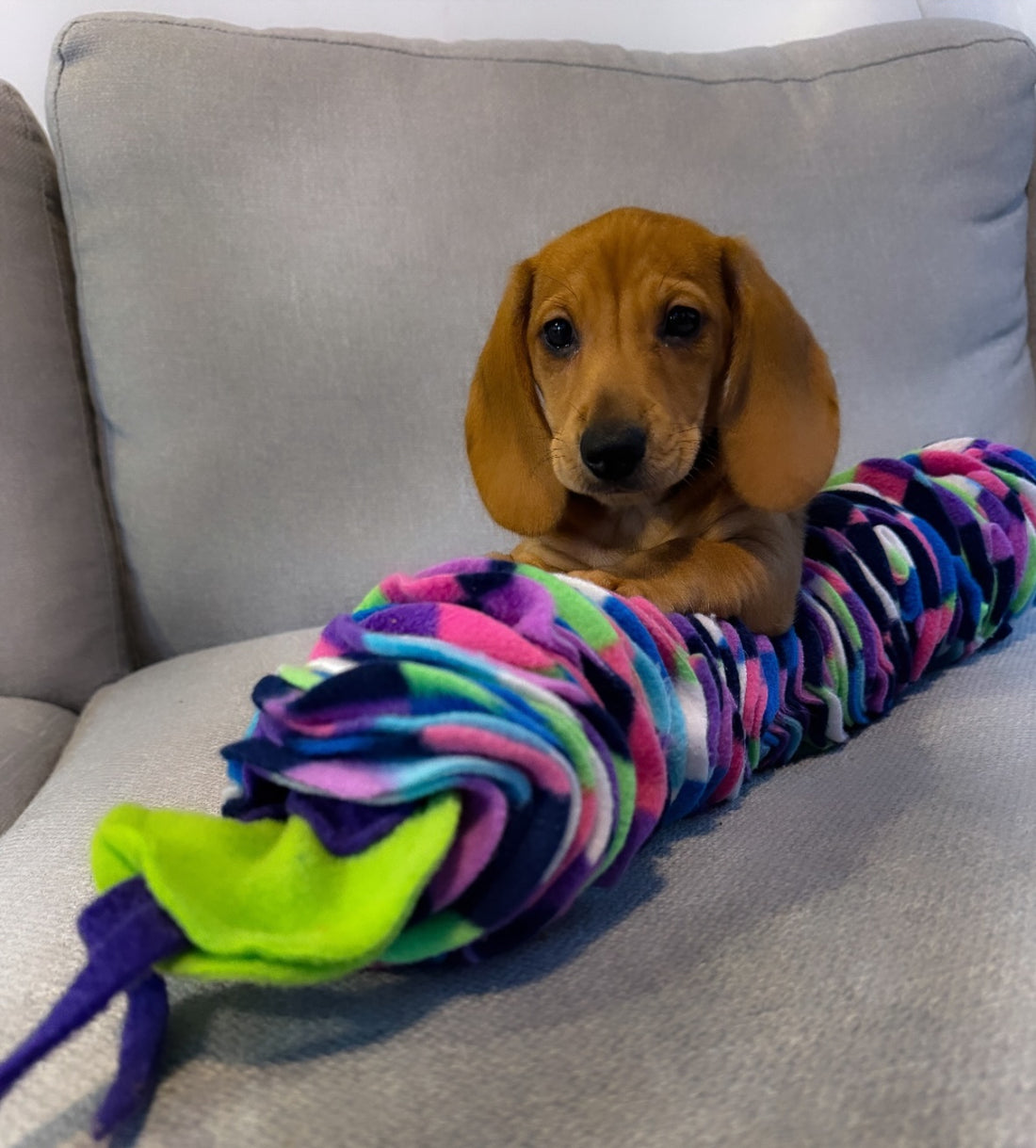Bringing home a new puppy is an exciting and rewarding experience, but it also comes with its challenges. Just like bringing a new member into your family, welcoming a puppy into your home requires preparation, patience and dedication. Whether you're a first-time dog owner or adding another furry friend to your pack, having a plan in place can make the transition smoother for both you and your new companion.
Throughout your puppies first 30 days, you'll cover essential topics such as socialisation, potty training, puppy enrichment, obedience training, nutrition, grooming, and healthcare. Each day of the 30-day plan will focus on specific milestones and tasks to help you track your puppy's progress and ensure that you're providing the care and attention they need to thrive.
So, whether you're embarking on this journey for the first time or looking to refine your puppy-raising skills, "Nurturing Your New Puppy: A 30-Day Blueprint for Success" is here to guide you every step of the way. Let's embark on this adventure together and create a loving and harmonious home for you and your furry companion.
Day 1-7: Welcoming Your Puppy Home
Congratulations on bringing your new furry friend home! The first day with your puppy is an exciting and crucial time as you start building the foundation for a strong and loving relationship. Here's a guide to help you make Day 1-7 a smooth and memorable experience for both you and your puppy.
Prepare Your Home:
Before your puppy arrives, ensure that your home is safe and puppy-proofed. Remove any hazardous items or small objects that your puppy could chew on or swallow. Block off areas that are off-limits to your puppy, such as stairs or rooms with delicate items.
Create a Safe Space:
Designate a comfortable and cosy area for your puppy to rest and relax. This space could be a crate, a bed, or a soft blanket in a quiet corner of your home. Make sure it's equipped with food and water bowls, toys, and a comfortable sleeping area.
Introductions:
When you bring your puppy home, introduce them to their new environment gradually. Start by showing them around the house on a leash, allowing them to explore at their own pace. Keep introductions calm and positive, avoiding overwhelming your puppy with too much excitement or attention.
Potty Training:
Begin potty training your puppy immediately by taking them outside frequently, especially after eating, drinking, sleeping, or playing. Use verbal cues and praise to encourage them to potty in the designated area. Keep an eye out for signs that your puppy needs to go potty, such as sniffing or circling.
Mealtime:
Feed your puppy a high-quality puppy food recommended by your veterinarian. Follow the feeding instructions on the packaging and establish regular mealtimes to help regulate your puppy's digestion. Avoid feeding them table scraps or human food, as it can lead to digestive upset and unhealthy behaviours.
Patience and Understanding:
Remember that your puppy is adjusting to a new environment and may feel anxious or overwhelmed at first. Be patient and understanding as they settle in and get to know their new surroundings. Provide reassurance, love, and plenty of positive reinforcement to help them feel safe and secure.
Day 8-14 Introduction to Basic Training and Socialisation
As your puppy settles into their new home, it's time to start introducing them to basic training and socialisation. These early experiences are crucial for shaping your puppy's behaviour and helping them become a well-adjusted member of your family. Here's a guide to help you navigate this important stage:
Basic Commands:
Begin by teaching your puppy some basic commands such as "sit," "stay," and "come." Use positive reinforcement techniques like treats, praise, and gentle guidance to encourage your puppy to follow your cues. Keep training sessions short and fun to maintain your puppy's interest and focus.
Leash Training:
Introduce your puppy to wearing a leash and collar gradually. Start by letting them wear the collar indoors for short periods, then gradually attach the leash and let them drag it around under supervision. Encourage your puppy to walk beside you on the leash using treats and gentle guidance. Practice walking in different environments to help your puppy get used to various stimuli and distractions.
Socialisation:
Expose your puppy to different people, animals, sounds, and environments to help them become well-socialised. Arrange playdates with other vaccinated and friendly dogs, invite friends and family members over to meet your puppy, and take them on outings to pet-friendly places. Ensure that these experiences are positive and rewarding for your puppy, and always supervise their interactions with other animals and people.
Handling and Grooming:
Get your puppy used to being handled and groomed from an early age. Practice touching their paws, ears, mouth, and body gently, and reward them for staying calm and relaxed. Introduce them to grooming tools such as brushes and nail clippers gradually, and make grooming sessions a positive and enjoyable experience for your puppy.
Crate Training:
Introduce your puppy to their crate as a safe and comfortable den where they can rest and relax. Start by placing treats and toys inside the crate to encourage your puppy to explore and associate it with positive experiences. Gradually increase the amount of time your puppy spends in the crate, making sure to praise and reward them for calm behaviour. Avoid using the crate as a form of punishment, and never leave your puppy crated for extended periods.
House Training:
Continue with house training by being consistent with your puppy's feeding, potty breaks, and supervision. Take your puppy outside regularly, especially after meals, naps, and play sessions, and praise them for eliminating in the appropriate area. Clean up any accidents indoors promptly and use positive reinforcement to encourage your puppy to go potty outside.
Day 15-21: Mastering the Basics: Obedience Training Essentials
As your puppy continues to settle into their routine and environment, it's time to focus on mastering the basics of obedience training. Building a strong foundation of obedience skills will help your puppy become a well-behaved and responsive companion. Here's a comprehensive guide to essential obedience training during Days 15-21:
Recall (Come Command):
Teach your puppy to come when called by using a consistent command such as "come" or their name. Start in a quiet, enclosed area with minimal distractions. Call your puppy's name followed by the command and reward them generously with treats and praise when they come to you. Gradually increase the distance and add distractions to strengthen the recall command.
Sit:
Teach your puppy to sit on command by holding a treat close to their nose and moving it upwards and slightly behind their head. As your puppy follows the treat with their nose, their bottom will naturally lower into a sitting position. As soon as their bottom touches the ground, say "sit" and reward them with the treat. Practise this command frequently throughout the day in different locations.
Stay:
Start teaching your puppy to stay in a sit or down position by using a verbal cue such as "stay" or a hand signal. Begin with short durations and gradually increase the time as your puppy becomes more comfortable. Use treats and praise to reinforce the stay command, and only release your puppy from the stay position with a release cue like "okay" or "free."
Down:
Teach your puppy to lie down on command by luring them into the position with a treat. Hold the treat in your hand and lower it to the ground in front of your puppy's nose. As they follow the treat, their body will naturally lower into a down position. Say "down" as soon as they are fully down and reward them with the treat. Practise this command regularly to reinforce the behaviour.
Leave It:
Train your puppy to leave items alone on command by using the "leave it" cue. Start with a low-value item such as a toy or treat on the ground. Cover the item with your hand and say "leave it." When your puppy looks away or shows disinterest, praise them and offer a more desirable treat as a reward. Gradually increase the difficulty by using higher-value items and adding distractions.
Heel:
Introduce your puppy to walking politely on a leash by teaching them the "heel" command. Start in a quiet area with minimal distractions and use treats and praise to encourage your puppy to walk beside you with a loose leash. Reward them for staying close to your side and paying attention to your cues. Practise this command frequently during walks to reinforce good leash manners.
Day 22-30: Pet Enrichment and Long-term Wellness
As your puppy continues to grow and develop, it's essential to focus on their long-term well-being and provide opportunities for enrichment and mental stimulation. These activities not only keep your puppy physically and mentally healthy but also strengthen the bond between you and your furry companion. Here's a guide to pet enrichment and long-term wellness during Days 22-30:
Enrichment Activities:
Puzzle Toys: Introduce puzzle toys that dispense treats or food as your puppy plays with them. These toys provide mental stimulation and keep your puppy entertained while satisfying their natural instincts to forage and explore.
Interactive Games: Play interactive games such as hide-and-seek or fetch to keep your puppy engaged and mentally stimulated. These games also provide an opportunity for physical exercise and bonding between you and your puppy.
Training Challenges: Continue to challenge your puppy with new training exercises and commands to keep their mind sharp and engaged. Teach them fun tricks or participate in canine sports such as agility or obedience competitions to provide mental and physical stimulation.
Socialisation Opportunities:
Puppy Playdates: Arrange playdates with other vaccinated and friendly dogs to provide your puppy with opportunities for socialisation and positive interactions with other animals.
Meet and Greet: Take your puppy to pet-friendly places such as dog parks, pet stores, or outdoor cafes to expose them to different people, animals, and environments. Ensure these experiences are positive and rewarding for your puppy, and always supervise their interactions.
Physical Exercise:
Daily Walks: Continue to take your puppy for daily walks to provide them with the physical exercise they need to stay healthy and burn off excess energy. Vary your walking routes to keep things interesting and explore different environments together.
Playtime: Set aside time each day for interactive play sessions with your puppy. Use toys such as balls, ropes, or tug toys to engage your puppy in active play and strengthen your bond through shared experiences.
Health and Wellness:
Veterinary Check-up: Schedule a wellness check-up with your veterinarian to ensure your puppy is growing and developing properly. Discuss any concerns or questions you may have about your puppy's health and wellness, including nutrition, vaccinations, and parasite prevention.
Proper Nutrition: Feed your puppy a balanced and nutritious diet tailored to their age, breed, and size. Provide fresh water at all times and monitor your puppy's weight and body condition to ensure they maintain a healthy physique.
Mental Stimulation:
Training Sessions: Continue to engage your puppy in regular training sessions to keep their mind sharp and reinforce obedience skills. Use positive reinforcement techniques such as treats, praise, and play to motivate your puppy and make learning fun.
Enrichment Toys: Rotate and introduce new toys and enrichment activities to keep your puppy mentally stimulated and prevent boredom. Offer a variety of toys with different textures, shapes, and functions to keep your puppy engaged and entertained.
Rest and Relaxation:
Provide your puppy with plenty of opportunities for rest and relaxation throughout the day. Create a comfortable and quiet space where your puppy can retreat and unwind when they need a break from stimulation and activity.
By focusing on pet enrichment and long-term wellness during Days 22-30, you're helping to ensure that your puppy grows into a happy, healthy, and well-rounded companion. Enjoy exploring new activities and experiences together, and cherish the special bond you share with your furry friend!

